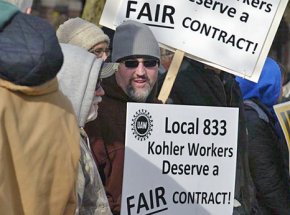Kohler workers stand united
and report from the picket line on a battle pitting union workers against of one of Wisconsin's corporate giants.
MORE THAN 2,000 workers at Kohler Co. are in the fourth week of a strike against management's insistence on maintaining a two-tier pay scheme. The strike by United Auto Workers (UAW) Local 833 began on November 15 after 94 percent of workers rejected management's proposal.
Kohler Co. is known for its plumbing products, like bathtubs and faucets. The factory is located in the village of Kohler, Wisconsin, just west of Sheboygan.
Day two of the strike began with workers marching from their union hall to the Kohler plant entrance. Blocking and disrupting traffic continued on and off for three days, when Sheboygan County Judge James Bolgert issued an injunction limiting the ability of picketers to control access to the plant.
The previous contract, which expired on September 1, was negotiated in 2010 when Kohler management used the economic downturn to justify a five-year wage freeze, higher health care premiums and a two-tier wage and benefit system.
On the picket line, one striking worker with 36 years of experience said that with the economy doing better and the company reaping high profits, "We should get something fair this time." That means getting rid of the two-tier wage scale.

The aim of the two-tier pay and benefit system is to pit senior workers against new hires. Kohler has about 1,600 workers in tier A and 400 in tier B. The solidarity and support coming from tier A workers is a testament to the united resistance to management's divide-and-rule tactic.
Many of the tier A workers we met on the picket line had participated in a 1983 strike, the last time UAW local 833 stopped production. That walkout lasted 16 days, with militant pickets stopping scab cars. Two striking workers were injured when a car drove through the picket line.
KOHLER WORKERS have a long history of standing up to management's attacks, dating back to 1934. During the Great Depression, workers struck for seven years, demanding that the UAW replace the company union that collaborated with management. Then-company President Walter J. Kohler Sr., who was governor of Wisconsin between 1929 and 1931, did everything he could to try to keep the UAW out of Kohler.
Workers waged pitched battles, including street fighting with the company's heavily armed private deputies. Using guns and tear gas, company thugs killed two strikers.
The UAW finally won a contract at Kohler, but the struggle against management continued. Again, in 1954, workers fought a nine-year battle with management, culminating in the National Labor Relations Board ruling in favor of the Kohler workers' right to organize outside of the company union and affiliate with the UAW.
During this fight, workers weren't just standing up to management but also Wisconsin's political establishment. From 1951 to 1957, Walter J. Kohler Jr. was governor of Wisconsin, and the Kohler family remains an economic and political fixture in Wisconsin.
The tradition of resistance to management intimidation continues today. Workers have been picketing for nearly a month, taking shifts to ensure the longevity of the strike.
We met a worker who started at Kohler just last March. For her, the experience of the strike has been very emotional, because, as she said, tier A workers "are sticking their necks out for us." She felt that the proposed wages for tier B workers were too low, and that "a living wage of $15 per hour" is needed.
Rumors have spread that office workers have been pulled directly into production on the foundry floor. At the same time, strikers report nods and waves of approval from office windows and from van drivers who are still working at the plant.
Teachers from Manitowoc traveled to Kohler for the day to show their solidarity. Manitowoc Education Association member Johanna Worley was there because, she said, "We're all struggling as unions."
She put the strike in the context of Republican Gov. Scott Walker's Act 10 "Budget Repair Bill" in 2011, which provoked the month-long occupation of the state Capitol building--and the anti-union "right-to-work" legislation that Walker signed into law in March. Like CEO David Kohler, "Walker is using divide-and-conquer" tactics to weaken and isolate our unions, she said.
A group from the Friends of the Black River Forest, who are protesting against plans for a new golf course in the village of Kohler, were also there to show their solidarity. Their protest targeted David Kohler as anti-worker and anti-environment.
UAW LOCAL 833 is facing week four of its strike, and contract talks have resumed with meetings between the union and management planned for this week. Some strikers are optimistic that management will bargain in good faith. We will learn more as the week progresses.
What's clear is that the strike has the potential to have a broad impact in Wisconsin and the U.S. Many unions retreated following the 2008 economic crash, and now UAW Local 833 is ready to take back what it lost.
Ben Braeger, a brass pre-setter at Kohler, said in online comment that the strike is "about making sure that current and future generations are capable of getting fair pay for fair work...It's about being able to contribute to a community that stands with us. Anyone that tells you different isn't listening to what we're saying."
Local 833 is putting solidarity front and center in their strike as all members fight for the roughly 400 Tier B workers. We must follow their example and support UAW Local 833. That means spreading the word about their strike, battling the lies and misrepresentations in the media, passing resolutions of support in our own organizations and unions, and supporting the strike fund.


